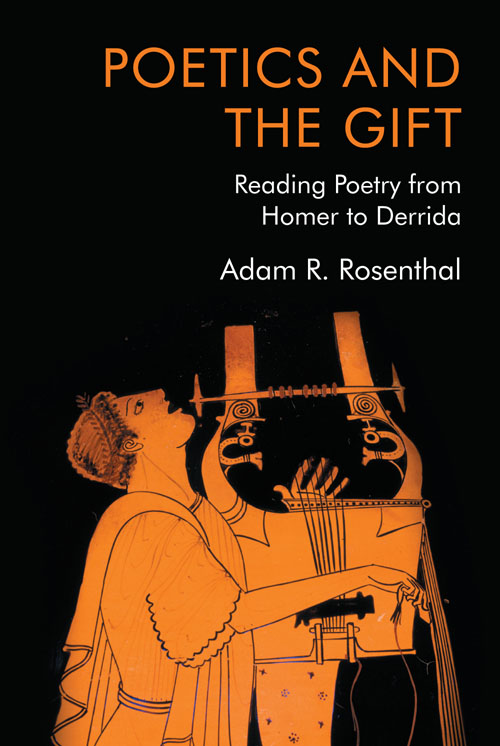
Two Concepts of the Gift
To GIVE. v.a. preter. gave; part. paff. given
1. To beftow; to confer without any price or reward.
Conftant at church and change; his gains were fure,
His givings rare, fave farthings to the poor. Pope’s Epiftles.
4. To pay as price or reward, or in exchange.
He would give his nuts for a piece of metal, and exchange
his sheep for fhells, or wool for a fparkling pebble. Locke.
Samuel Johnson, Dictionary of the English Language, 1755
I begin with an excerpt from Samuel Johnson’s 1755 Dictionary of the English Language in order to make a simple observation: There is, and has been for some time, an uncertainty about the meaning and function of the gift. The gift—what we call “the gift” and “giving”—appears to have at least two distinct functions, and one would be hard pressed to decide between them.
Johnson here marks out two opposing usages, as though in passing from the one, to the other, it was a simple matter of preference. Between Pope and Locke (between the poet and the philosopher), there would be two gifts: one conferred “without any price or reward,” the other paid “as price or reward, or in exchange.”
If the poet gives—or desires to give—as an excess without return, then the philosopher (who, remarkably, still speaks in rhyme!), gives—or desires to give—within a measured economy of give and take, or what is more commonly called “exchange.”
Reconciling Excess with Exchange
We have here two opposing concepts of the gift. Now, these “concepts” are not necessarily irreconcilable. It is the particular innovation of Marcel Mauss and, following him, Pierre Bourdieu, to think these two apparently incommensurate visions of giving together, as part and parcel of the same. According to a long line of anthropological thinking, it is the particular function of the gift to appear to exceed the logic of exchange (so that it may perform generosity and excess), all while the gift secretly, or unconsciously, solidifies the bonds that tie individuals, groups, or populations together, by recording or inscribing the debts that obligate. As Mauss writes at the beginning of The Gift:
The subject is clear. In Scandinavian civilization, and in a good number of others, exchanges and contracts take place in the form of presents; in theory these are voluntary, in reality they are given and reciprocated obligatorily. [Marcel Mauss, The Gift: The Form and Reason for Exchange in Archaic Societies, trans. W. D. Halls (New York: Routledge, 1990), 3.]
The performance of a gift without return (be it within the Christian context that Pope imagines or that of the Scandinavian peoples that Mauss analyzes), in fact fulfills essential social roles, and it does so only on the condition of exceeding the cold commercial transactions of the market economy, which prize utility above all else. Thus, according to this line of thinking, the difference between what Pope and Locke envision, as giving, is not one of opposition. Rather, it is a matter of two isolated moments at the extremes of what, in truth, is a continuum. In each case, what is essential is the exchange, the difference between “generous gift” and “obligating contract” being at best secondary, even if each of these forms begets quite different social and interpersonal effects.
Yet what would it mean to take seriously the excess that Pope, the poet, speaks of? To deny, in sum, the continuum between gift and exchange? And is it simply a coincidence that this vision of bestowal, “without any price or reward,” emerges from the pen of a poet?
The Gift in Poetry
In Given Time, the philosopher Jacques Derrida responded to these questions, arguing that any gift worthy of the name “gift” ought to be unreciprocated and outside of every economy of exchange. In Poetics and the Gift: Reading Poetry from Homer to Derrida, I take this insight a step further, showing how the idea of a gift without return lies at the very heart of Western conceptions of poetry. It is through the gift, I argue, that poets and philosophers alike ground the field of poetry as distinct from that of prose. In this way, the poetic tradition, from Homer and up through Percy Shelley, Charles Baudelaire, Gertrude Stein, and M. NourbeSe Philip, struggles with precisely the ambivalence that Mauss identified. Yet from their struggle emerge ever-novel and surprising ways of parsing excess from exchange. The dream of a gift without return is not simply a fantasy of poets. It is a proposition whose roots are to be found in the nature of language itself, and upon whose possibility rests the very potential for what we call “poetry.”
About the author
Adam R. Rosenthal is Assistant Professor of International Studies at Texas A&M University. His research focuses on poetry and poetics, deconstruction, literary theory, and continental philosophy. He has published essays in The Philosophical Salon, SubStance, Oxford Literary Review, and Research in Phenomenology, andis the editor of “Derrida’s Classroom,” Poetics Today 42.1 (2021).
You can read about his new Edinburgh University Press book Poetics and the Gift on our website here. Save 30% on your purchase with discount code NEW30 .
Sign up for our mailing list!
Interested in learning more about Poetics and the Gift and other titles from Edinburgh University Press? You can sign up for our mailing list here!





